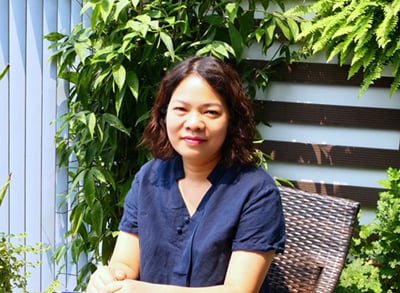 |
Nguyen Thi Thanh HaiAssociate Professor, Doctor of Philosophy, Deputy Director of the Institute for Human Rights, Ho Chi Minh National Academy of Politics.
"Human rights are a highlight in Vietnam - Australia relations. For the Ho Chi Minh National Academy of Politics, this cooperation was a milestone."
|
For Nguyen Thi Thanh Hai, the 50 years of Vietnam - Australia diplomatic ties could be summed up in three words: Practicality - Gender equality - Education.
Practicality means that the Vietnam - Australia ties are not simply about diplomacy, but include practical cooperation in various areas. For Hai personally, this relates to her scholarship from the Australian government to pursue an internationally-recognised doctoral degree.
Gender equality is an aspect of great importance in Australia yet sometimes a barrier to development in Vietnam. For instance, Vietnamese women have to overcome a multitude of obstacles in pursuing scientific research.
Regarding education, Hai finds Australian post-graduate education exceptionally impressive, and this is a key area of cooperation for the two countries to provide qualified human resources for policymaking in Vietnam.
Australia has been one of the longest partners of the Ho Chi Minh National Academy of Politics in human rights, from 1995 until today. They have organised multiple seminars and training courses on the fundamental knowledge of human rights for the academy’s lecturers, as well as officers of various government agencies and sectors in Vietnam. The academy also receives support from Australian partners in developing a database of international laws on human rights, and the first set of teaching materials on human rights law.
Hai has directly participated in joint projects between Vietnam and Australia. In 2009, she studied for her doctoral degree in Human Rights Law at the University of Sydney on an AUSAID scholarship. At that time, this discipline was still relatively new in Vietnam in terms of academics, while the political context was not yet open to this specialised field of study.
“I’m proud of achieving the doctoral degree. I had to put in tremendous effort. During the process of writing a doctoral thesis, there were many days when I was under stress due to differences in language, research methods, and academic thinking,” Hai recalls. “But I was able to make use of what I learned in Vietnam and produce specific results in the field of human rights research.”
With her doctoral thesis on corporate human rights responsibility, upon her return to Vietnam, Hai became an advisor to UNDP and many other organisations to offer research and training on this issue. She also published her first book Q&A on business and human rights and joined the review and development of Vietnam’s legal framework related to business and human rights.
Hai, together with her colleagues, also participated in preparing a proposal to open the master and doctoral programme on human rights law at the Ho Chi Minh National Academy of Politics. She was also directly involved in the conception of a cooperation project between the Australian Human Rights Commission and the Institute of Human Rights, which plans to bring human rights into public schools. Hai says: “With this project, teachers are given training and access to new teaching methods and quite a new way of thinking. I was delighted when a colleague told me that thanks to this training, they become more enthusiastic about teaching human rights.”
From an organisational perspective, when assuming the managerial role, Hai has made efforts to create a more academic environment at the institute with specialised meetings for information updates and capacity enhancement for lecturers. “Having had the chance to interact and study in an international environment, I aspire to create a conducive learning environment for my institute,” she says. “I want to share with my colleagues the research and teaching experiences in the field of human rights that I learned during my time studying in Australia.”
